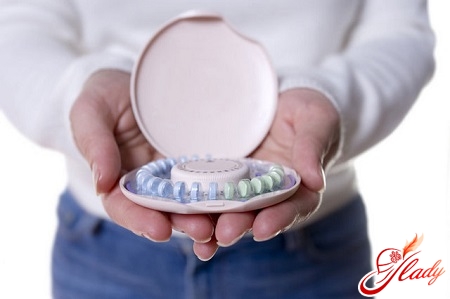
Very often after childbirth, women together withtheir gynecologist selects the most suitable contraceptives to avoid re-conception. Many people are interested in the question of which contraceptive pills during lactation will not harm the baby's health. And such worries arise for good reason. In fact, a considerable number of contraceptives can harm the health of the child. But modern medicine has gone far ahead. Special drugs have long been developed that can be safely used during breastfeeding. Without causing any harm to the child, they serve as an excellent contraceptive for a woman. Which one to choose and what should be taken into account?
When is it necessary to take contraceptives?
After one birth and until the next pregnancyat least two years must pass. This time is necessary for the body to fully recover and be ready to bear a child again. Not all women are happy about conceiving again after childbirth, and for some it is a serious problem. But not every woman thinks about contraception, citing the fact that the likelihood of getting pregnant is significantly reduced when breastfeeding. But is this really true? You should not rely on this opinion. Contraception is also necessary for nursing mothers if about six months have passed since childbirth. This is exactly the time when a woman's menstrual cycle is restored, and the child is additionally fed with other products in addition to breast milk. But there are often cases when pregnancy occurs immediately after childbirth (in the first months). A woman who is sexually active can never be 100% insured against unwanted pregnancy, especially if she does not take any contraceptives or does not use other contraceptives. It is recommended to use contraception even for those who want to have another child. Here, medical indicators come into play, indicating that until the uterus is fully restored and to avoid serious complications, it is necessary to wait at least a year, and only then plan a child again.
What contraceptives are recommended by doctors during breastfeeding?
It is worth saying right away that the choiceThe range of contraceptives for women who are breastfeeding is very limited. Contraceptives for nursing mothers differ from contraceptives for everyone else in that they must be as reliable and absolutely safe as possible. When breastfeeding, interrupted intercourse, measuring body temperature, and the calendar method are considered absolutely useless methods of contraception. Such contraceptives cannot be called reliable. Barrier contraceptives (condoms) can prevent unwanted pregnancy, but the best method is considered to be specially developed contraceptives for nursing women. It is also possible to use spermicidal topical agents, which may include tablets, ointments, and suppositories. There are cases when after childbirth a woman is recommended to use hormonal intrauterine systems (IUDs). Gynecologists clearly prefer contraceptive pills developed specifically for nursing mothers. A properly selected drug can protect against unwanted conception, does not cause any harm to the child’s health, and does not reduce the volume of breast milk.
What contraceptive pills are suitable for nursing mothers?
Common birth control pills,which were taken by a woman before pregnancy are unlikely to be suitable after childbirth. Here it is necessary to take pills specially designed for nursing mothers. Such pills should not contain estrogen - a hormone that is contained in all combined oral contraceptives. The female hormone estrogen can significantly reduce the volume of milk and affect the health of the newborn baby. The basis of pills specially designed for nursing mothers is the hormone gestagen. Medical studies conducted repeatedly indicate the safety of this hormone. Gestagen is a natural hormone for the female body. During pregnancy, a high concentration of this hormone is characteristic. Contraceptive pills designed for women during lactation create conditions in the female body as if pregnancy has already occurred. This means that the egg is not able to mature in such conditions, and conception thus becomes impossible.
More about contraceptives
The best means of protection against unwantedconception are considered hormonal contraceptives. When taken correctly, hormonal contraceptives can give a woman a high level of reliability and turn her sex life into a means of pleasure. During intercourse, you will not need to worry about a possible pregnancy, you can calmly relax and enjoy the process. Modern contraceptives are divided into two categories. The first category includes single-component drugs, which contain only one hormone, progesterone. Otherwise, this drug is called mini-pills. There are also two-component or combination drugs. In addition to progesterone, they also contain the hormone estrogen. Two-component hormonal drugs are also divided into several types: drugs with microdoses of hormones, medium-dose, with low doses of hormones, and high-dose. Of all the contraceptive pills, the most gentle should be considered mini-pills (single-component).
How do tablets for contraception work?
Contraceptive pills consist ofsynthetically created hormones that are similar to female sex hormones produced during pregnancy. Progesterone and estrogen can inhibit the production of other hormones that promote the maturation of follicles, due to which the ovulation process occurs. Therefore, estrogen and progesterone, administered in small doses in the form of a tablet, can prevent or not allow the maturation of the egg. It is on this principle that the entire mechanism of action of COCs (combined oral contraceptives) is based. Mini-pills (single-component hormonal drugs) act in much the same way. But here special attention is paid to the mucous membrane of the uterus. Mini-pills can change the viscosity of the secretion inside the cervical canal. Under the influence of these drugs, the endometrium becomes loose, and the viscosity of the secretion increases significantly. This leads to the fact that it becomes very difficult for sperm to fertilize the egg, and the egg itself is no longer able to attach itself inside the uterus. After stopping taking such hormonal drugs, all these phenomena disappear, the reproductive function is restored within two to three months after the end of the intake. If birth control pills are taken strictly according to the instructions, their effect is almost 100% effective. In addition to contraceptive properties, such drugs can restore a woman's monthly cycle, relieve her of pain during menstruation, and solve the problem of uterine bleeding. Taking hormonal pills, you can get rid of premenstrual syndrome, stop the growth of unwanted facial hair and prevent acne on the skin.
The use of alcohol and side effects during the intake of birth control pills
There is a possibility that the effectivenesscontraceptive pills after taking large doses of alcoholic beverages may decrease. The most important thing is to avoid alcohol poisoning, which can provoke vomiting. This can lead to the fact that the pill taken a little earlier will not be absorbed by the body. Alcohol should be consumed in reasonable quantities, and the time interval between the pill taken and alcohol should be at least two hours. In case of emergency, you can slightly shift the intake of the pill, taking it, for example, in the morning. But in this case, you should strictly follow the instructions attached to the drug. Taking contraceptive pills, like many other drugs, is often accompanied by side effects. At the very beginning of taking the drug, spotting of blood from the vagina may be observed, which, as a rule, disappears after the body adapts to the drug. The hormone estrogen, which is part of COCs, can cause increased blood pressure, fluid retention, headaches, bloating, and swelling in the legs. The hormone progestin can cause acne, irritability, and nervousness, and contribute to weight gain. Taking the drugs can cause increased appetite, which will lead to weight gain. Increased levels of the hormone estrogen can cause vascular thrombosis. Taking some contraceptives requires a woman to completely stop smoking, which can cause a stroke or heart attack. COCs can contribute to the formation of stones in the bile ducts and even cause attacks of gallstone disease. Sometimes side effects can be observed when combining COCs with antifungal drugs or antibiotics.
Harm from taking birth control pills
As already mentioned, in a woman's life it is not uncommonThere are times when she thinks about the need to use contraceptives. Such periods include the lactation period, the postpartum period, the period after a miscarriage or abortion. During lactation, it is advisable to use single-component contraceptives, which contain a single hormone, progestin. Among such drugs are charosetta, microlute, exluton and many others. Taking COCs is strictly prohibited, because they can harm the health of the newborn. Often there is a need to take contraceptives after an abortion or miscarriage. Hormonal contraceptive pills, in addition to their main function, also have a therapeutic one. After all, it is known that combined OCs can restore a woman's hormonal background, serve as a means of preventing endometriosis, and can cure fibrocystic mastopathy. It is reasonable to use COCs after an artificial termination of an unwanted pregnancy, they can reduce the risk of developing inflammatory diseases. Combined OCs include Regulon, Femoden, Mercilon, Logest, Ri-Mersi, Silest, Yarina, Diane-35, Belara and others. These are products with an average estrogen content (no more than 35 mcg). The effect of its use is observed after taking the first pill. The listed drugs do not require the use of any other additional methods of contraception.
COC admission after birth and cancellation of contraceptives
According to statistics, every tenth woman becomes pregnantin the first months after childbirth. Such pregnancy is most often unwanted and requires termination. The choice of contraceptive drug after childbirth should be individual, taking into account the characteristics of the body. Two to three months after childbirth, it is recommended to start taking OCs, which will protect against re-conception. As a rule, when breastfeeding, a woman is infertile in the first five to six months after the start. If breastfeeding is carried out, then during the first five months it is possible not to use any contraceptives. Taking contraceptives should begin no earlier than six to seven weeks after childbirth. Experts have proven that taking OCs does not have a negative effect on the fetus in the early stages of pregnancy. However, after it is established that pregnancy has occurred, it is recommended to immediately stop taking contraceptives. Cancellation of OCs in other cases is characterized by the restoration of the ovulation process within two to three months after the end of the intake. After stopping the medications, it is recommended to see a gynecologist who will check you for inflammatory and infectious diseases, and sometimes for oncological diseases of the uterus. The probability of conceiving a child after stopping taking OCs is very high. In this way, you can perfectly plan your pregnancy.
Are there any contraindications for taking oral contraceptives?
Taking absolutely any medicationsimplies the presence of contraindications, and hormonal contraceptives are no exception. So, taking oral contraceptives is indicated for smoking women over 35 years of age. Severe liver diseases (cirrhosis, hepatitis) are a serious contraindication for taking hormonal pills. Complicated diabetes mellitus, venous thrombosis, coronary heart disease, previous heart attack or stroke, hypertension, rheumatoid arthritis and many other diseases are serious contraindications for taking oral contraceptives. In case of existing depression, migraine, varicose veins, diabetes, PMS, oral contraceptives should be used strictly under the supervision of a gynecologist. Very rarely, after stopping the drug, a woman experiences frequent depression, menstrual irregularities, sometimes skin problems, etc. Women get scared and wonder if they have developed an addiction to taking steroids. There is no need to be afraid, medical studies have proven that there is no dependence on taking hormonal contraceptive drugs. This can only indicate that the drug was chosen incorrectly. After some time, all the symptoms go away. So, there are a huge number of means that can protect against unwanted conception and pregnancy. All drugs have their pros and cons. Like all other drugs, contraceptives have their contraindications and side effects. The choice of a contraceptive should be made together with the attending physician, otherwise an incorrectly chosen drug can harm the body. In order to avoid all the negative consequences, it is not recommended to choose such drugs on your own. And the period of breastfeeding requires special attention and choice of means. It is necessary to carry it out only with the help of a doctor who will choose the most suitable one for you.









